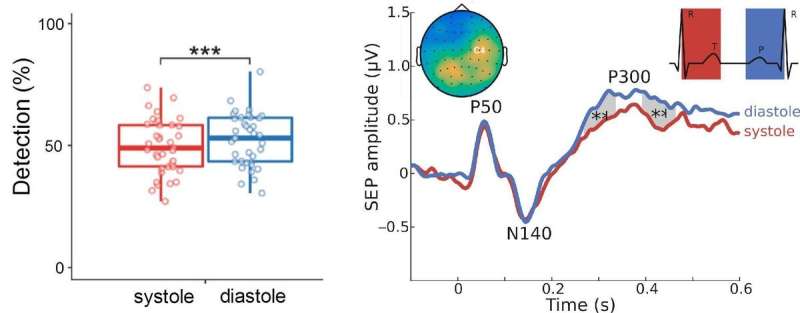How the heart affects our perception

The heart and brain communicate constantly. For example, when encountering a dangerous situation, signals from the brain ensure that the heart beats faster. When relaxing, the heart slows down. Interestingly, the heartbeat also affects the brain, but the underlying mechanisms are unclear. Researchers at the Max Planck Institute for Human Cognitive and Brain Sciences (MPI CBS) in Leipzig and Berlin School of Mind and Brain have now identified two mechanisms underpinning how the heart influences perception and the brain, and how these mechanisms differ between individuals.
The first mechanism establishes a relationship between the phase of the heartbeat and conscious experience. In a regular rhythm, the heart contracts in the so-called systolic phase and pumps blood into the body. In a second phase, the diastolic phase, the blood flows back and the heart fills up again. In a previous publication from the MPI CBS, researchers reported that perception of external stimuli changes with the heartbeat. In systole, it is more difficult to detect a weak electric stimulus in the finger compared to diastole.
Now, in a new study, Esra Al and colleagues have found the reason for this change in perception: Brain activity is changing over the heart cycle. In systole, a specific component of brain activity associated with consciousness, the so-called P300 component is suppressed. In other words, it seems that in systole, the brain makes sure that certain information is kept out of conscious experience. The brain seems to take into account the pulse in systole and predicts that pulse-associated bodily changes are "not real," but rather due to the pulse. Normally, this suppresses conscious awareness of the pulse. However, weak stimuli that coincide with systole we might be missed although they are real.
During their investigations on heart-brain interactions, Al and colleagues also revealed a second effect of heartbeat on perception: If a person's brain shows a higher response to the heartbeat, the processing of the stimulus in the brain is attenuated—the person detects the stimulus less. "This seems to be a result of directing our attention between external environmental signals and internal bodily signals," explains study author Al. In other words, a large heartbeat-evoked potential seems to reflect a "state of mind" in which we are more focused on the functioning of our inner organs such as the blood circulation, but less aware of stimuli from the outside world.
The results not only have implications for our understanding of heart-brain interactions in healthy persons, but also in patients. Senior author Arno Villringer explains, "The new results might help to explain why patients after stroke often suffer from cardiac problems and why patients with cardiac disease often have impaired cognitive function."
The researchers investigated these relationships by sending weak electrical stimuli to electrodes clamped onto the study participants fingers. In parallel, they recorded each participants' brain processes using an EEG and their cardiac activity using an EKG.
More information: Esra Al et al, Heart–brain interactions shape somatosensory perception and evoked potentials, Proceedings of the National Academy of Sciences (2020). DOI: 10.1073/pnas.1915629117


















